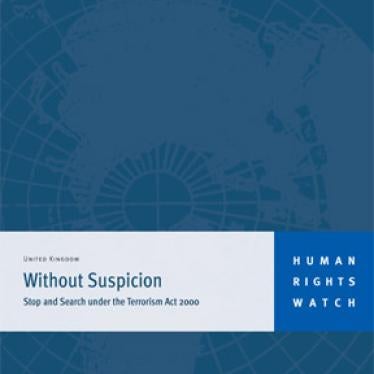(London) - The United Kingdom coalition government's proposals to reform controversial counterterrorism measures contain improvements, especially on pre-charge detention, but fall short of bringing counterterrorism law and policy in line with international human rights standards, Human Rights Watch said today. The first set of legislative proposals, on terrorism pre-charge detention and stop and search powers, were included in the Protection of Freedoms Bill published by the government on February 11, 2011.
"Today's changes on stop and search and pre-charge detention are a step forward," said Benjamin Ward, deputy director of the Europe and Central Asia Division. "But overall the government has missed an opportunity for bolder reform to end abusive policies that have tarnished the UK's reputation at home and abroad."
Home Secretary Theresa May outlined the full set of proposed measures to Parliament on January 26, following the conclusion of a government review begun in July 2010. Parliament is expected to consider the remainder of the proposed changes in the coming months.
The review considered six key elements of UK counterterrorism policy, including control orders, lengthy pre-charge detention, police powers to stop and search people and vehicles in the absence of suspicion of wrongdoing, and the deportation of foreign terrorism suspects to countries with poor records on torture, accepting assurances against such ill-treatment from the countries involved.
Control Orders
Under the government's proposals, control orders - which restrict the movement of terrorism suspects - would be replaced by new measures known as "terrorist, prevention and investigation measures," including nighttime curfews and electronic tagging, as well as intensive surveillance operations in certain cases. Restrictions on internet and phone access, which affected families of those subject to the orders, would be relaxed. People under these orders would no longer be relocated far from their habitual city of residence. Restrictions would be imposed for a maximum of two years, and the imposition of a new order after that time would require new evidence.
Control orders were introduced in 2005 after the House of Lords Judicial Committee (now the Supreme Court), ruled that indefinite detention of foreign terrorism suspects was unlawful. The orders can be imposed on both UK and foreign nationals whom the authorities are unwilling to prosecute, or whom the authorities say they cannot prosecute, and in the case of foreign nationals, cannot be deported. Eight people are currently subject to control orders.
Human Rights Watch said that parliament should reject the modified control orders and insist that the authorities rely on judicially-supervised surveillance and criminal prosecution to deal with people suspected of involvement in terrorism.
Human Rights Watch has repeatedly criticized the inadequate procedural safeguards and the reliance on secret evidence as a basis for issuing control orders. The proposed reform would not improve judicial safeguards, and the standard of proof would remain far below that required for a criminal conviction, Human Rights Watch said.
Rulings by the European Court of Human Rights and UK courts have limited the use of secret evidence and the duration of the orders, but the government retained the power to impose restrictions - amounting in some cases to serious restrictions on human rights - for an indefinite period of time on the basis of a low standard of proof.
Pre-Charge Detention
The government has allowed the provisions of the Terrorism Act 2006 permitting pre-charge detention in terrorism cases for up 28 days to lapse, bringing the maximum back to 14 days. The Home Secretary has indicated that the government intends to retain the right to introduce emergency legislation allowing a 28-day limit in urgent circumstances such as multiple coordinated attacks or during multiple large and simultaneous investigations.
The reduction to 14 days is a positive change to a power that violated the right to a fair trial and was counterproductive, Human Rights Watch said, but it remains far longer than 96-hour period allowed for other serious crimes. Under the Labour government, pre-charge detention in terrorism cases increased from seven days in 2000, to 14 days in 2003, and 28 days in 2006.
Stop-and-Search Powers
The government also announced it would repeal overly broad counterterrorism stop-and-search powers, but it wants to be able to authorize their use for short periods and around specific sites. The Terrorism Act 2000 gave police throughout the UK the power to stop and search vehicles and individuals to prevent terrorism, without need for reasonable suspicion that a crime had occurred or was being planned.
Human Rights Watch research found that the safeguards intended to prevent misuse of this power were ineffective and that the power had violated human rights and damaged community relations. The government suspended stop-and-search powers in July 2010 following a European Court of Human Rights ruling that the use of these violated the right to a private life. In October 2010, the Home Office released statistics showing that police made more than 100,000 stops using these powers between April 2009 and March 2010, but had failed to make a single arrest for terrorism as a result.
The government's proposed reform would allow a senior police officer to authorize "no suspicion" stop and search in a circumscribed geographical area and for a limited time when there is a reasonable suspicion that an act of terrorism will take place and that this power is considered necessary to prevent an attack. The Terrorism Act 2000 imposed a lower threshold, of expediency, and could be used when there was suspicion that an attack may take place.
Though more narrowly drawn and with a higher threshold for authorization and use, the proposed changes would still allow the government to authorize police to stop individuals without any reasonable suspicion of criminal wrongdoing, creating a risk of misuse. Parliament should repeal this power once and for all, and police should rely on powers that require reasonable suspicion, Human Rights Watch said.
Deportation With Assurances
The government's unwillingness to abandon the policy of deportation with assurances to remove foreign terrorism suspects is particularly disappointing, Human Rights Watch said. Diplomatic assurances are commitments from receiving governments that they will not mistreat people transferred to their territory. They are sought from countries where torture and ill-treatment are serious problems, ostensibly to ameliorate the risk that a person will be subject to such clandestine, brutal abuse.
The UK has reached formal agreements on diplomatic assurances with Jordan, Libya, Lebanon, and, most recently, Ethiopia, and accepts informal assurances from Pakistan and Algeria. In her speech to Parliament in January, the home secretary called the policy "legitimate and necessary," and the review recommended that the government "actively pursue deportation arrangements with more countries." The Grand Chamber of the European Court of Human Rights is set to rule in 2011 on the UK's efforts to return a terrorism suspect to Jordan under the agreements.
Human Rights Watch research has found that these no-torture promises are inherently unreliable. Because diplomatic assurances are unenforceable, it is unlikely that there would be any consequences for the country that breaches them, and in most cases it is practically impossible to determine whether a breach has occurred. Neither the sending nor the receiving country has any incentive to carry out serious investigations.
Post-return monitoring, a feature of the agreements the UK has sought, would not protect returnees from torture or reprisals. In situations where only one detainee or a small group is being monitored, confidentiality could not be provided, and prison or detention facility authorities would know where the allegations of ill-treatment came from. Experience has shown that detainees are reluctant to report abuse in those circumstances for fear of reprisals against them or their families.







